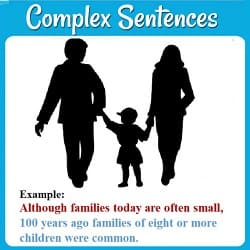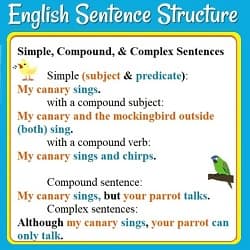How to Make Compound
Sentences
Compound sentences combine two clauses into one sentence. (Clauses are each a potential sentence with a subject and predicate.) Complex sentences do that too.
However, compound sentences use a conjunction (or sometimes a semicolon) to join two or more equal, independent clauses.
- The conjunction ‘and’ combines two similar thoughts.
- ‘But’ (and 'yet') show a contrast between the thoughts.
- ‘Or’ indicates that only one of the two is correct.
- 'Nor' is used like 'or' when neither thought is true.
- ‘So’ shows that the second thought follows from the first.
- 'For' can sometimes be used to mean 'because.'
You could put the list above into simple sentences, each starting ‘The conjunction____.’
A shorter, more elegant, alternative is to combine facts about the most common conjunctions into one or two compound sentences:
The conjunction ‘and’ combines two similar thoughts; ‘but’ shows a contrast between the thoughts. ‘Or’ indicates that only one of the two thoughts applies, and ‘so’ shows that the second thought follows from the first.
It’s also possible to combine two independent clauses without a conjunction. In that case you would use a semicolon instead of a comma to separate them. (That's what I did in the first sentence of the example in italics above.)
You can say ‘I like ice cream, but he prefers butter.’ You can also say ‘I like ice cream; he prefers butter.’
Both are correct, although sometimes using a conjunction makes the thought clearer.
Compound Sentence Examples:

- My family went to the park yesterday, and we had a wonderful time.
- Larry’s family went to the zoo, but they didn’t enjoy it.
- His children were scared of the lions; they left right away.
- Your children are older, so they probably wouldn’t be scared.
- Do you want to take them to the zoo, or would it be wiser to go to the park?
- Let's go to the zoo, but we can start with the monkeys!
You can express the connection between ideas using two sentences rather than one compound sentence. Instead of using ‘and’ between clauses, you could make the second clause a new sentence. (You might begin it with ‘in addition’ or 'furthermore.'
Contrasting sentences can begin with ‘however’ or ‘nevertheless;’ others with ‘as a result,’ ‘consequently,’ ‘as an alternative,’ ‘instead,’ etc.
However, these are all more formal than a compound sentence. (I thought about demonstrating these with the same example of family trips to the zoo, but we would never use such academic language for a family trip!
I can’t imagine one parent telling another, “Larry’s family went to the zoo. However, they didn’t enjoy it.” In conversation English speakers would use ‘but’ every time!)
Other Ways to Combine Sentences
Sometimes two sentences can be combined without needing to
make a compound sentence. If both
subjects or both verbs are the same, we can make two sentences into one
simple sentence (= only one clause) with a compound subject or a compound verb.
Examples:
- Jim enjoys skiing. Susie enjoys skiing too.> Jim and Susie both enjoy skiing.
- Bruce is very efficient at work. He is efficient at home too.> Bruce is efficient at work and at home.
- I like to walk in the park. I also like watching the ducks there.> I like to walk in the park and watch the ducks there.
Note that in the last example I changed the form of the 2nd verb (from a present participle to an infinitive) so they would share the same form. Parallel constructions are easier to understand and sound better. Teachers and test-givers look for them when reading essays. (They may take off points when two similar thoughts are expressed in different ways:
Michael rides his bike every day. He also practices judo and is always watching baseball games on T.V.)
Better:
Michael rides his bike every day. He also practices judo and watches baseball games on T.V.
or: Michael rides his bike, practices judo, and watches baseball games on T.V. every day.
Try Making Compound Sentences
Take out a piece of paper and combine these sentences.
You can make compound sentences using a comma and conjunction or using a semicolon (;). Sometimes you could make a simple sentence using a compound subject or verb instead.
Use parallel constructions whenever possible. (Answers at the bottom of this page.)
1. I have studied Spanish for many years. As a result, my Spanish-speaking friends can chat easily with me now.
2. You are quite intelligent. However, you don’t think before you act.
3. My friends Jesse and Jennifer have just moved into a new home. They’ve made many changes in its appearance.
4. Susie could study music next year. She could study drama instead.
5. Larry watches the news. Bill makes news.
Compound sentences are fairly easy to make, as they combine two similar clauses. Sometimes we need to combine unequal thoughts or clauses.
Complex Sentences explains how to make sentences combining unequal clauses. It talks about noun, adjective, and adverb clauses, as well as subordinate conjunctions and relative pronouns.
English Sentence Structure summarizes sentence formation of all types.
Possible Answers
(Other answers may also be correct.)
1. I have studied Spanish for many years, so my Spanish-speaking friends can chat easily with me now.
2. You are quite intelligent, but you don’t think before you act.
3. My friends Jesse and Jennifer have just moved into a new home, and they’ve made many changes in its appearance.
or: My friends Jesse and Jennifer have just moved into a new home and made many changes in its appearance.
4. Susie could study music or drama next year.
or: Susie could study music next year, or she could study drama (instead). (You can omit ‘instead,’ or leave it in the sentence for greater emphasis.)
5. Larry watches the news, but Bill makes news.
or: Larry watches the news; Bill makes news.
(If I said these aloud, I would heavily stress ‘makes.’)
Home> English Grammar Lessons> Compound Sentences.
Didn't find what you
needed? Explain what you want in the search box below.
(For example, cognates, past tense practice, or 'get along with.') Click to see the related pages on EnglishHints.
| site search by freefind | advanced |







